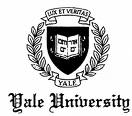Today, we visited and gained access to the beautiful Sterling Library and had four more lectures. In one of these lectures, Dean Nick Coburn-Palo continued his lesson on An Overview to Studying Philosophy at Ivy Scholars by explaining the social contract theory and how it was interpreted by Thomas Hobbes, John Locke, and Jean-Jacques Rousseau. A social contract is an agreement among people to form a government in order to protect claims available to them under natural law. Natural law is defined as God's law of the jungle, or how we ought to or do live. Two more definitions are necessary to understand a social contract. Natural rights are what individuals are inherently due as human beings because of natural law. The state of nature is the implicit comparison between a society with government or with no government.
Hobbes believes that the state of nature is barbarous, rather, it is a state of war. People are self-absorbed liars and are basically animals. The only natural right in this society is the right to be able to avoid one's own death. Therefore, an absolute government is necessary for this social contract to function. It would be ruled by a sovereign who had complete power. This kind of belief was acceptable (although it would be seen as extremely radical today) because it was written in a time of monarchies.
Locke, on the other hand, believes that people are basically good, but to become truly efficient we must unite as a functional society with a social contract. He believes in the natural rights of life, liberty, and property. The type of government is determined by the people because he believes in the consent of the governed. However, instead of ending there, he controversially explains that when the government infringes upon the natural rights of the people then the people have the obligation to revolt.
Rousseau believes that our state of nature was the ideal environment we now long for. However, we abandoned it when we abandoned our ability to share. Natural rights are the right to competition, which separates an individual's will from the general will of the people. He thinks that a legislature is ideal for the type of government, because a members of the legislature temporarily puts individual will on hold in order to push for general will. Dean Coburn-Palo pointed out that Rousseau would probably be horrified by our legislative system today, which bursts at the seams with lobbyists and such. He also explained that Marx believes exactly what Rousseau believes, except he disagrees about not being able to return to our original state of nature. He believes that socialism will wean us off capitalism to the point where we can achieve this primitive but ideal ability to share.
I'm sorry that I don't have time to share other things I learned today, but I really need to go to sleep. Thanks for reading this and goodnight!
Monday, July 27, 2009
Subscribe to:
Post Comments (Atom)





Yohanna,
ReplyDeleteThere is such a HUGE difference between what’s being taught to you and what was taught at some of our other ILC schools. After some of their lectures I found myself trying to unteach some of the things that were being impressed upon gullible young students but here you’re being provided with both sides of the argument so you can make choices on your own based on a greater source of information.
I’m afraid that I have to disagree with you, though, on one your statements about Hobbes’ beliefs being looked at as “extremely radical today”. Take a look at some of our seats of power within the government in recent years—especially in the office of the Vice President during the first eight years of this century and tell me that Hobbes wasn’t revered there. AND, there were large members of our government and amongst the populace that agreed whole heartedly.
ONLY IF YOU HAVE THE TIME, Yohanna, I’d love to read more. This is good stuff.
Yohanna,
ReplyDeleteOn further reflection about the philosophies of Jean-Jacques Rousseau, he was a major influence in the French Revolution and it was his admonition that the populace had an OBLIGATION to revolt which was the impetus for quite a number of social upheavals in France in the century after he philosophized and cost the lives of many hundreds of thousands of people. What he was saying sounds good in a speech but when they apply his words to real lives the world can be changed and not necessarily in a positive fashion.